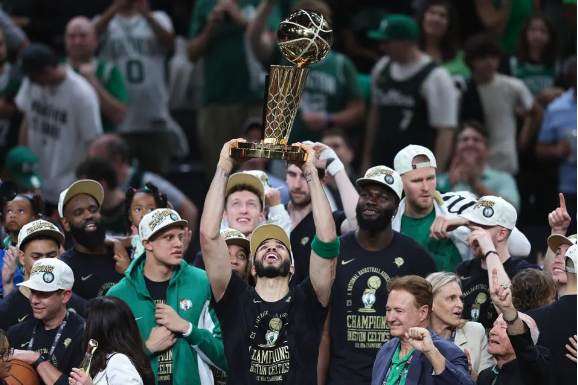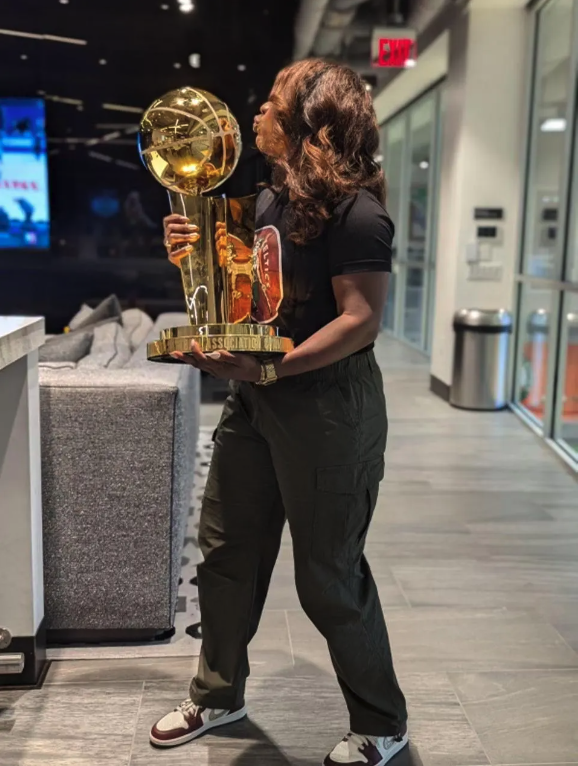Championship Mindset: NBA Boston Celtics’ Mind Health Program

The Boston Celtics’ triumphant journey to an NBA championship is frequently attributed to their on-court prowess and physical performance. However, a crucial and less visible component of their success can also be attributed to their comprehensive Mind Health and Wellness program. I had the pleasure of sitting down with Candice Williams, Ph.D., LMHC, to discuss how her programming contributed to the success of the team. Williams was brought on at the end of the 2021-2022 season for the first full time position in the mental health and wellness space in the Celtics organization. She has successfully developed the Mind Health and Wellness Program over the past two years, fostering mental resilience and well-being among players and staff throughout the organization.
Before joining the NBA, Williams had built a strong career in sports and mental health. In 2014, she transitioned into the sports world, working at the NFLPA to assist players as they transitioned out of professional sports and navigating their new normal. After 5 years with the NFLPA, she moved to Ohio State University’s Department of Athletics where she was immersed in supporting football players as well as other student-athletes for 3 years.
Inception and Evolution: Building a Foundation of Trust
Prior to Williams arrival, the organization initially started with a consultant-based approach; however, the team recognized the importance of mental health and wellness programming and saw the need for a full-time position. When the opportunity presented itself for Williams to interview with Boston, she was eager to make a positive impact in a new environment. She truly wanted to get an understanding of where she could be most impactful from a player experience perspective. Williams explains, “What people would assume to be small interactions, do in fact have a big impact.”
Her presence at practices, breakfasts, and even casual interactions with both players and staff became a cornerstone of the program, emphasizing the importance of being human first and embracing authenticity. “My initial goals were to build relationships and to observe,” says Williams.
William’s Mind Health & Wellness Program’s success lies in its adaptability and seamless integration into the players’ routines. She describes her typical game day routine. In the morning, she’ll attend and observe practice while checking in with some colleagues. At this time, she’ll confirm the schedule for pre-game routines with the players she works with. After practice, Williams works out, finding a way to incorporate movement into her routine, as she knows the importance of self-care. For a 7:30pm tip-off, she’ll arrive to the arena at 4pm and connect with colleagues prior to starting work with the players. She emphasizes the importance of her presence, not just as a mental health professional but as a supportive figure on staff.
“My goal is to show up for players in a way that shows you’re invested in their development on and off the court – that speaks volumes,” says Williams. She then moves to the Wellness Room near the locker room where she meets with players. “We work on breathing techniques, like diaphragmatic breathing and progressive muscle relaxation, and the goal is to help them be in a place where they can pause and it helps keep them settled,” explains Williams. This highlights the importance of practicing grounding techniques.
Championship Impact: Embodying Winning Behaviors
The Mind Health and Wellness Program, in collaboration with the other departments such as health and performance and front office, played a role in the Boston Celtics’ championship run by promoting a mindset of joy, gratitude, and composure throughout the organization. Williams acknowledges that this was an organization-wide effort to maintain consistent messaging. Head coach Joe Mazzulla emphasized these values, and Williams reinforced them, ensuring that players and staff internalized these principles.
“For our players, embodying championship behaviors means choosing joy and gratitude and leaning into adversity,” Williams notes. “This philosophy permeated throughout the organization, with players referencing these values in press conferences and their daily interactions”.
Williams recounts a powerful moment for her. “One of the things that solidified that for our organization and publicly was that Jason at his press conference said everyone impacts winning from the ball boy to the coaches and that’s just a testament to how we view what it takes to be a champion,” explains Williams. “We became champions before we ever got the trophy, because we value what it means to be different yet come together as a collective.”
Collaboration and Integration: A Holistic Approach
Williams emphasizes the importance of collaboration, highlighting how this is a critical aspect of the program. Through collaboration with coaches, medical staff, health and performance personnel, and front office, Williams was able to ensure a holistic approach to player well-being. “Everyone this year bought into making a commitment to how can I be better to help the organization,” says Williams. She worked closely with coaching staff to ensure language is being used consistently in order to best help players. She acknowledges that it was a collaborative effort from all departments to win the championship. “Once you’ve been able to provide a service and connect with people, integration can lead to more collaboration,” explains Williams.
Sustainability and Future Growth
Looking ahead, Williams envisions continued growth and integration of mental health services within the Celtics organization. When asked how she continues to develop successful programming, she answers, “What’s helped me have success is if I come into the space authentically myself.” Williams has been able to brilliantly balance maintaining a player-first environment while gaining support from key stakeholders. Williams astutely says, “Confidentiality is driven by the player to share what they want – my number one priority is trust with the player first, foremost, and always.”
The Celtics’ Mind Health and Wellness program, under Williams’ leadership, sets a precedent for integrating mental health services into professional sports.






